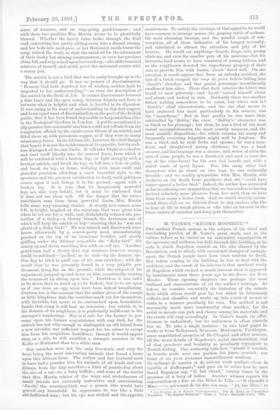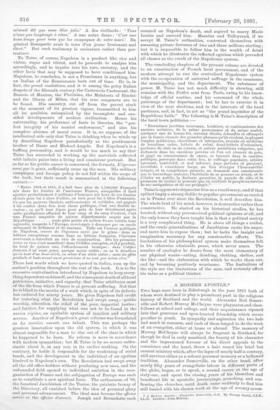M. TAINE'S "REGIME MODERNE."*
THE modern French system is the subject of the third and concluding portion of M. Taine's great work, and in the volume before us he enters on an exhaustive examination of the spacious and uniform, but dull, barrack-like building, as he calls it, which Napoleon erected on the site cleared by the Revolution, and in which, with occasional changes of manage- ment, the French people have been since content to dwell. But before coming to the building, he has to deal with the architect, and the result of his labours is that mordant study of Napoleon which excited so much interest when it appeared by instalments some three years ago in the Revue des Deux Mendes. These opening 'chapters are perhaps the most brilliant and characteristic of all the author's writings. As before, he remains essentially the historian of the minute facts which others would pass by, but which he laboriously collects and classifies and works np into a sort of mosaic or cento in a manner peculiarly his own. The method is not. necessarily much more trustworthy than another, for the artist in mosaic can pick and choose among his materials, and the result will vary accordingly. In Taine's hands its effec- tiveness is undoubted; but its unfairness is often scarcely less so. To take a single instance : in two brief pages he works in from Talleyrand, Remusat, Metternich, Varnhagen,. some unpublished memoirs of De Chaptal, and other sources,. all the worst details of Napoleon's social shortcomings, and of that gaucherie and brutality so peculiarly repugnant to
French feeling. One authority tells how, " quand ii souriait, sa bouche smile avec une portion des joues, souriait ; son
front et ses yeux restaient itnranablement sombres Ce nAlange de sourire et de s6rieux avait quelque chose de terrible et d'effrayant ;" and goes on to relate how he once heard Napoleon say, "11 fait °baud," twenty times in the presence of a bevy of ladies. Another witness reports his conversation at a fete at the Hotel de Ville :—" Ii r6pondit h Mme. —, qui venait de lui dire son nom : 'Ah, bon Dieu! on * Les Originee do la Frareo Contemporaino. Par H. raffle, do l'Aoathimio Francais°. "Lo Weal() Modena)." Tome I. Paris Hachette ot Ole. 1591. sn'avait dit quo vette etiez jolio.' A des vieillards ' Vous n'avez pas longtemps d vivre.' A tine autre dame : (Yost une beau temps pour vous que los campagnes de votre mart.' En
general Bonaparte avait le tenu d'un jeune lieutenant mai 4dlevO." But such testimony is caricature rather than por- traiture.
To Taine, of course, Napoleon is a product like vice and virtue, sugar and vitriol, and he proceeds to analyse him accordingly, and to inquire into his race, ancestry, and the other facts that may be supposed to have conditioned him.
Napoleon, he concludes, is not a Frenchman in anything, but an Italian of the Renaissance born out of time. He is, in fact, the grand condottiere, and it is among the petty Italian
despots of the fifteenth century, the Castruccio Castracani, the Braccio of Mantua, the Piceinino, the Malatesta of Rimini, and the Sforza of Milan, that his true congeners are to be found. His ancestry, cut off from the parent stock at the moment of its greatest vigour, transmitted to him all its qualities, unimpaired by the incomplete and one- sided developments of modern civilisation. Hence his universality, his preference of facts to theories, the "per- fect integrity of his mental endowment," and also his 'complete absence of moral sense. It is, we suppose, of the intellectual side only that Taine is thinking when he winds up by describing Napoleon paradoxically as the posthumous brother of Dante and Michael Angelo. But Napoleon's is a baffling personality, and it would be too much to say that Taine has succeeded in working up the materials collected with infinite pains into a living and consistent portrait. But
so far as his public career is concerned, the formula, L'ogoisme ,servi par le genie, sufficiently sums up the man. His military
campaigns and foreign policy do not fall within the scope of the book, but their result is summarised in the following -extract :—
" Entre 1804 et 1815, il a fait tuer plus de 1,700,000 Francais ,n6s dans lea limites de l'ancionne Franco, auxquelles il faut sjouter probablement 2 millions d'hommes nes hors de cos limites et tubs pour lui a titre d'alli6s, ou tu6s pour lui It titre d'ennemis. Ce quo les pauvres Gaulois, enthousiastes et credules, ont gagn6s lui confer deux fois lour chose publique, c'est one double in- vasion; ce lour 'ague pour prix de lour devoAment apres cette prodigieuse effusion de Jour sang et du sang d'autrui, c'est tine France amputee de quinze departements acquis par la Republique seule plus petite an milieu du ses VOiSillS tous agrandis, suspecte It l'Europe, enveloppee It demeure par un carol() menacant de d6fiances et de rancune. Tolle eat l'osuvre politique .de Napoleon, Ceuvre de regoisme Beryl par le genie : dans sa betisse europeenne comme dans as bittisse francalse, l'egoisme souverain a introduit tin vice de construction. Des leg premiers jours co vice s'est manifeste dans l'edifIce europeen, et il y produit, -au bout de quinze ans, l'effondremout brusque : dons l'dctifice francais il eat aussi grave, quoique moms risible; on no le cldmaera qu'au bout d'un demi-Wets, ou meme d'un siècle entier ; mats" sea effets sraduels et lents seront alh8Bi pernicieux et no sont pas moina stirs."
These last words which we have quoted in italics, sum up the .author's position throughout the rest of the book. It is to the excessive centralisation introduced by Napoleon to keep every-
thing dependent on himself, and the consequent death of all local patriotism, initiative, and capacity, that Taine attributes most of the ills from which France is at present suffering. Not that he is blind to the merits of a work which, in spite of its defects, has endured for ninety years. He gives Napoleon full credit for restoring what the Revolution had swept away,—public worship, education, the relief of the poor, impartial justice; ,a,r,d further, for supplying what was not to be found in the ancien regime, an equitable system of taxation and military service. Another of Napoleon's great reforms was formulated as La carribre ouverto crux talents. This was perhaps the greatest innovation upon the old system, in which it was almost impossible for a man to rise out of the class in which he happened to be born. No reform is more in accordance with modern sympathies ; but M. Taine is by no means enthu- siastic about it, at any rate in its earlier working. On the contrary, he bolds it responsible for the weakening of social bonds, and the development in the individual of an egotism kindred to Napoleon's own. The Revolution had swept away all the old office-holders without producing new ones, and the unbounded field opened to individual ambition in the reor- ganisation of France and the subjugation of Europe was such as to constitute a new spiritual force. The enthusiasm of '89, the fanatical Jacobinism of the Terror, the patriotic frenzy of the Directory, all vanished before the idea of personal glory and personal advancement. The ideal man became the offr,cier etrrivj or the offloier d'avenir. Joseph and Bernadotte each
counted on Napoleon's death, and aspired to marry Marie Louise and succeed him. Massena and Talleyrand, if we accept M. Taine's authorities, contented themselves with amassing private fortunes of two and three millions sterling ; but it is impossible to follow him in the wealth of detail with which he illustrates the reflected egotism which pervaded all classes as the result of the Napoleonic system.
The concluding chapters of the present volume are devoted to an examination of French local government, and of the modern attempt to run the centralised Napoleonic system with the co-operation of universal suffrage in the commune, the municipality, and the department. The substance of power, M. Taine has not much difficulty in showing, still remains with the Prefet sent from Paris, owing to his know- ledge of official routine, and his command of the whole patronage of the department; but he has to exercise it in view of the next elections, and in the interests of the local partisans, and, in fact, to act as "the grand inquisitor of the Republican faith." The following is M. Taine's description of the local town politician :—
" Euxmamos jacobins nouveaux, heritiers, et continuateurs des anciens seetairos, do la memo provenance et du memo ambit, quelques uns de bonne foi, oervaux etroits, 6chauffes et offusques par la fumee ehaude des grandee phrases gulls recitent, la plupart simples politiciens, charlatans et intrigants, avoe,ats ou mealecins de troideme ordre, lath% de rebut, demi-lettres d'estaminet, parleurs do club ou do coterie, et autres ambitieux vulgaires, qui distances dans lea ca,rrieres privies °A. Pon eat observe do pres, et gage en connaissanee de cause, se lancent dans la carrier° publique, parceque dans cette lice, le suffrage populaire, arbitre ignorant, inattentif, et mal inform', jugo prevenu et passione, moralist) It conscience large, an lieu d'exiger l'honorabilite intacte, et la competence prouvee, no domande aux concurrents quo le bavardage oratoire, l'habitude de se pousser on avant, et de s'etaler en public, la flatterio greasier°, is parade do zele, et la promosse do mettre le pouvoir quo va °enterer le pimple an service de sea antipathies et de sea prejuges."
Taine's opponents stigmatise him as a reactionary; and if that epithet imply a strong dislike to popular government as carried on in France ever since the Revolution, it well describes him. The whole bent of his mind, however, is destructive rather than constructive. He started on his historical studies, he has boasted, without any preconceived political opinions at all, and the only lesson they have taught him is that a political society is a very complicated thing. He is above all things a realist, and-the crude generalisations of Jacobinism excite his anger, and move him to expose them ; but he lacks the insight and imagination necessary for any constructive efforts. The limitations of his philosophical system make themselves felt in his otherwise admirable prose, which never soars. The number of analogies he draws from the most elementary of our physical wants—eating, drinking, clothing, shelter, and the like—and the elaboration with which he works them out, end by becoming positively wearisome. The limitations of the style are the limitations of the man, and seriously affect his value as a political thinker.







































 Previous page
Previous page